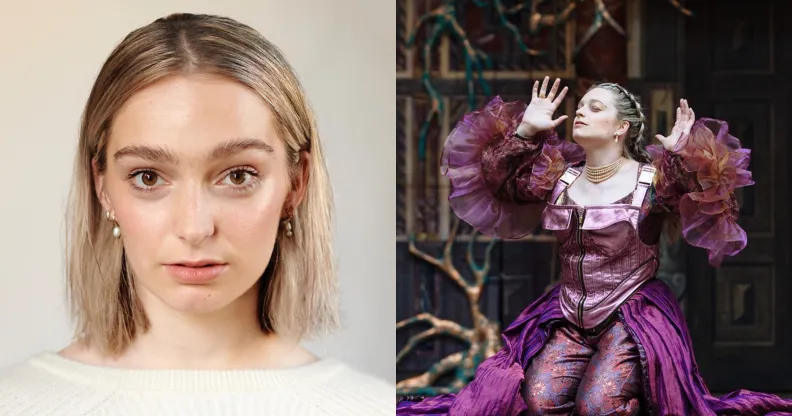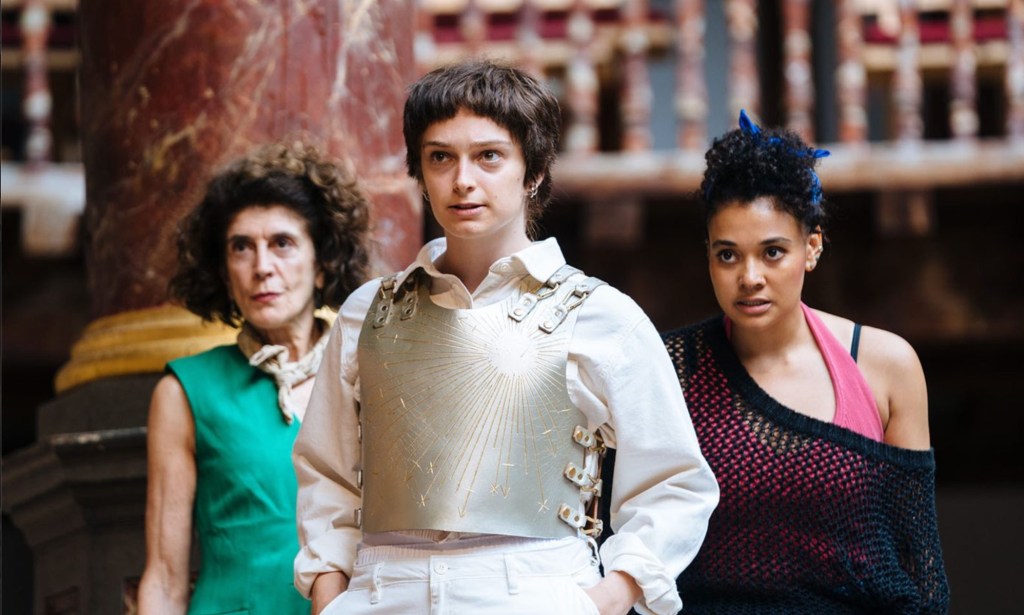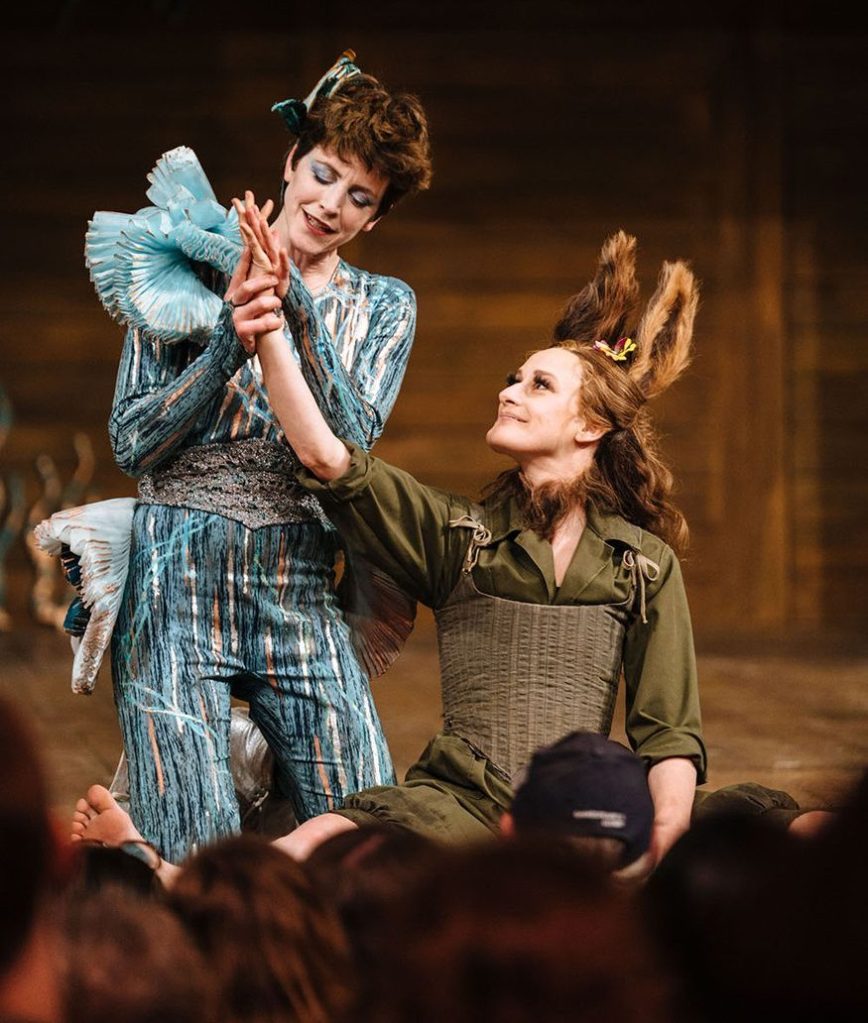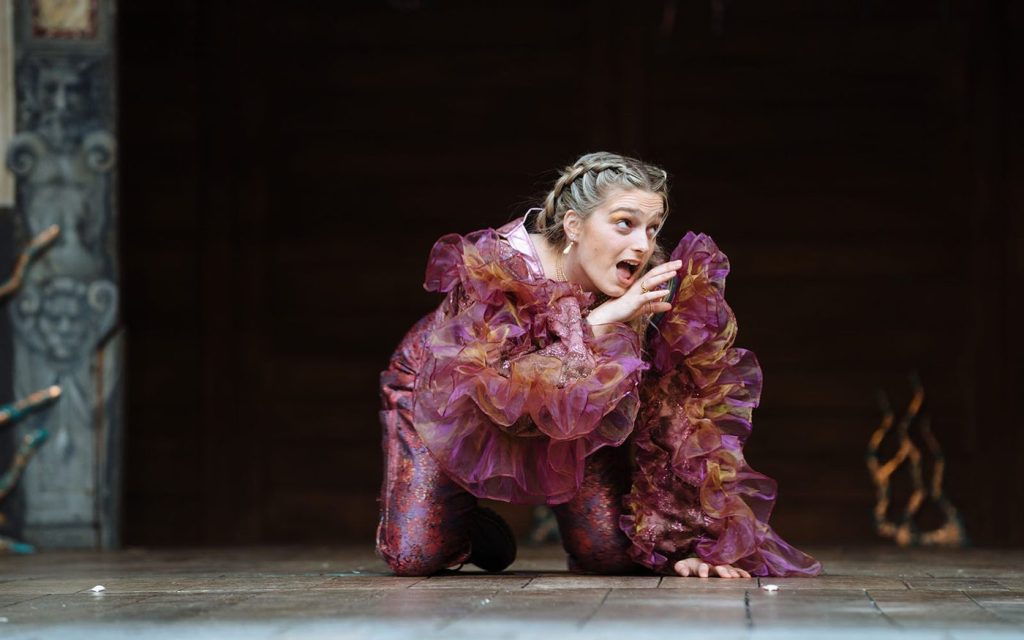I, Joan’s Isobel Thom on healing from transphobic backlash and queering Shakespeare

Isobel Thom plays Helena in the Globe’s A Midsummer Night’s Dream. (Helen Murray)
Isobel Thom plays Helena in the Globe's A Midsummer Night's Dream. (Helen Murray)
Non-binary I, Joan star Isobel Thom returns to the Globe Theatre in a beautifully queer adaptation of Shakespeare’s A Midsummer Night’s Dream.
In the summer of 2022, Thom was making history by starring as Joan of Arc in a bold reimagining of France’s patron saint as a “gender-questioning” hero with they/them pronouns. Written by non-binary playwright Charlie Josephine, I, Joan was performed at London’s living monument to the Bard himself – Shakespeare’s Globe.
Thom soon found themselves at the centre of a transphobic media storm, with right-wing publications accusing the show of rewriting history and pushing the ‘trans agenda’. Despite being mere weeks out of drama school, Thom didn’t let the media furore throw them off course.
The young actor returned to the stage where it all started in May this year, playing scorned lover Helena in an effortlessly queer adaptation of Shakespeare’s magical comedy A Midsummer Night’s Dream.
“It was strange,” Thom tells PinkNews about returning to the Globe after I, Joan. “It was something I had to think about a lot before coming back.”

The “huge influx of of hatred” from I, Joan which they described as a “baptism of fire” soon became irrelevant.
“It paled in comparison to the letters that I got from parents of trans kids who came with their kid to the show and it helped have a conversation that they’ve never been able to have,” Thom explains.
“Or older, non-binary people who had never been able to see themselves represented on stage before. That’s kind of it, right? Like, that’s why none of the hatred matters.
“At the end of the day, I can’t let it get to me. Because the the people I cared about the most felt seen and felt heard.”
For Thom, it felt like a “perfect stars aligning” moment to return for A Midsummer Night’s Dream with an ensemble cast.
Directed by Elle While, the adaptation follows four rebellious Athenian lovers – Thom as Helena, genderqueer stage stars Vinnie Heaven and Sam Crerar as Demetrius and Lysander, and Francesca Mills as Hermia – as they spend the night in an enchanted forest in habited by fairies.
With Oberon and Titania – the King and Queen of the Fairies – at war with one another, mischievous sprite Puck mixes up the administration of a love potion and chaos ensues.
Thom explains that they felt “less pressure” with A Midsummer Night’s Dream compared to I, Joan.
“It felt really special to be part of a company and I felt a lot less pressure,” they shared. “With Joan I felt – a lot through my own making – that I took on a lot of responsibility that I had to try and unlearn.”
And given the production’s largely queer cast, the LGBTQ+ element was more accidental than intentional. “It doesn’t necessarily feel like we are doing a ‘queer perspective’,” Thom told PinkNews.

“Every person in this company is so uniquely themselves, different genders, races etc, that this story was going to become ours because we were the ones telling it and it was our bodies on stage.
“We not bending anything to be queer. We are not changing the language or the narrative – we are not shoe-horning anything that isn’t already there. It just so happens we are coming into it as queer people.”
Co-star Vinnie Heaven echoed this sentiment, telling PinkNews: “It’s normal. We’re talented actors who have worked hard to get here and here we are.
“I think people expect us to be maybe grateful? But for me it’s an act of resistance to describe it as ordinary.”
With two women cast in the roles of enchanted lovers Bottom (Mariah Gale) and the Fairy Queen Titania (Marianne Oldham), the adaptation certainly does not shy away from queerness.
“I felt this occasionally with Joan,” Thom admits. “A lot of the time when we bring queer stories to these big main stages that aren’t where you would typically expect queer work to be, you have to sanitise yourself and tamp it down to make it more palatable for the audience and we didn’t want to do that.

“It’s amazing to look out and see so many young queer people among older straight people who maybe don’t get to see queer stories as often and discover it is not as scary and challenging and ‘vulgar’ as they think.
“[On the flip side] people who think that the theatre is not for them can pay like five quid a ticket to come in, stand in the sun with a drink, and watch people that look like them tell a really ridiculous story.”
Throughout rehearsals, Thom describes the cast as maintaining a “beautiful open process where we could have big conversations about exploring what queerness might mean to us and what it means to embody that night after night.”
Heaven adds: “As actors, we weren’t bound by any past versions of this show or anyone’s expectations of what it should be. That was very intentional and has meant that identity, love and relationships could be explored in expansive and beautiful ways.”
Thom, who actively chose to portray Helena as a cis woman, explored the character’s relationship with gender through costuming. There is a clear emphasis on Helena’s “performative femininity” used to survive a patriarchal society where marriage to a man was not only expected, but virtually inevitable.
“I was really keen to have an outline of the breast and body painted on the costume which felt cheeky for me as a non-binary person playing a woman,” they explain.

“It helped me detach from who I was playing as opposed to who I am and it leaned into the performance of it all and need for survival – Helena is working as much as she can to exist in this world.”
Thom believes we need to evolve our storytelling in ways that connect with new audiences to make works such as Shakespeare’s plays timeless.
“There is a reason that A Midsummer Night’s Dream remains people’s favourite and has been performed for 400 years,” they continue. “That is because they are so human and so joyous and so real, even in this mad, far-fetched, mystical, magical land.
“Just as with Joan, it never was, isn’t and will never be about erasing any group of people or any individual. It is about learning that we are capacious enough as people to have all of it. We can have stories that speak to us and stories that speak to people opposite to us.
“It’s never been about tearing one person down to lift another up. We all can exist at the same time and it can be really f**king cool and special. And people can learn something about someone else and realise we are not that different.”
A Midsummer Night’s Dream runs at Shakespeare’s Globe until 12 August 2023. Tickets are available here.

